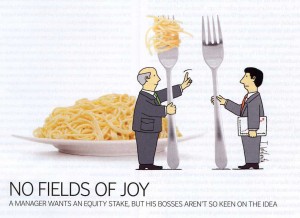This case study was prepared by Financial Post Magazine and the Pierre L. Morrissette Institute for Entrepreneurship at the Richard Ivey School of Business (Western University). The case method is a key learning tool in the cross-enterprise leadership approach used at Ivey. The views represented here are solely those of the case authors. Some details may have been changed to protect privacy.
On the Case, Fnancial Post Magazine, March 2013
By Stewart Thornhill, Executive Director, Pierre L. Morissette, Institute for Entrepreneurship, Richard Ivey School of Business, Western University
See Tove Rasmussen’s Expert View below.
 THE SITUATION: “IT HASN’T OCCURRED TO US TO OFFER EQUITY TO OUR EMPLOYEES,” SAID GREGORY YURCHAK, THE FOUNDER OF SASKATOON’S GOLDEN FIELD FOODS, A MANUFACTURER AND MARKETER OF ORGANIC WHOLE GRAIN PASTA PRODUCTS, AS SPEAKING TO SIMON MCLEAN, PRODUCT MANAGER FOR THEIR GOLDEN FIELD LINE.
THE SITUATION: “IT HASN’T OCCURRED TO US TO OFFER EQUITY TO OUR EMPLOYEES,” SAID GREGORY YURCHAK, THE FOUNDER OF SASKATOON’S GOLDEN FIELD FOODS, A MANUFACTURER AND MARKETER OF ORGANIC WHOLE GRAIN PASTA PRODUCTS, AS SPEAKING TO SIMON MCLEAN, PRODUCT MANAGER FOR THEIR GOLDEN FIELD LINE.
McLean had set up a meeting with Yurchak to ask for an opportunity to buy into the five-year-old company. “Please consider the fact that we already pay you a very competitive salary, we have a healthy bonus plan and great benefits,” Yurchak continued. “Now if you’d like to share your breakthrough idea with me, I’d love to hear it.”
McLean let the faintest sign of disappointment cross his face. He had spent a lot of time outside of work investigating his new product marketing ideas and wasn’t keen to reveal the results. He tried to think of a way to steer the conversation back to the issue of equity ownership.
 In his first year as product manager, McLean had increased sales in Golden Field’s pasta lines by 20% to $6 million, in a market where competitors were seeing no growth. With eight years of brand management experience at a major midwestern U.S. consumer products firm, McLean had taken the Golden Field Foods opportunity in Saskatoon in October 2011 to be closer to his family. The pay was competitive for someone of his experience level – in the low six figures – and it came with a bonus plan of up to 30% of base salary, among other things. Yurchak had impressed McLean, telling him that Golden Field needed someone like McLean, who seemed to combine brand-management experience with the ability to think like an owner-operator.
In his first year as product manager, McLean had increased sales in Golden Field’s pasta lines by 20% to $6 million, in a market where competitors were seeing no growth. With eight years of brand management experience at a major midwestern U.S. consumer products firm, McLean had taken the Golden Field Foods opportunity in Saskatoon in October 2011 to be closer to his family. The pay was competitive for someone of his experience level – in the low six figures – and it came with a bonus plan of up to 30% of base salary, among other things. Yurchak had impressed McLean, telling him that Golden Field needed someone like McLean, who seemed to combine brand-management experience with the ability to think like an owner-operator.
Yurchak, who had started the company in 2007 after selling his family’s farming business, owned about half the firm, with the remaining stake held by a group of five family members.McLean was their first outside hire with corporate experience. The owners had debated bringing someone like McLean on board, given that his salary alone was double or triple what they were paying each of their other six associates. But McLean seemed to prove his worth in short order, revising Golden Field’s trade marketing program and advertising, and sharpening their customer presentations. A month ago, he helped to improve the visual impact of their product packaging.
 However, McLean did ruffle feathers by insisting on overhauling the way marketing and operations functioned, forcing them to share information with each other in real time. “He’s effective, but he doesn’t respect the way things have been done before,” a disgruntled manager told Yurchak.
However, McLean did ruffle feathers by insisting on overhauling the way marketing and operations functioned, forcing them to share information with each other in real time. “He’s effective, but he doesn’t respect the way things have been done before,” a disgruntled manager told Yurchak.
McLean was focused on changing the way the category went to market. “My stretch goals are to grow the business by 20%. l’m fairly certain our momentum from last year will allow us to do that. But what if we can achieve a step change in growth? There are at least three viable product partnership opportunities that I’ve investigated. If they come to fruition, we could double our market share next year in pasta alone,” he had confided to a friend.
McLean was interested in making a large impact on the company he was working for and being rewarded for it. “I bring a lot to the table and it wouldn’t be unreasonable to think that I could spend a good part of my career at Golden Field,” he said. “Having the bonus ceiling of 30% of salary in place is becoming less appealing to me. I want to be more than just an employee.” His friend retorted: “Maybe you should take your ideas elsewhere.”
 lnstead, McLean brought up the issue during his Monday morning meeting with Yurchak. After the business issues were discussed, he talked about the potential to achieve rapid sales growth-beyond what was already in the stretch plan – and asked for the opportunity to buy into the firm.
lnstead, McLean brought up the issue during his Monday morning meeting with Yurchak. After the business issues were discussed, he talked about the potential to achieve rapid sales growth-beyond what was already in the stretch plan – and asked for the opportunity to buy into the firm.
Yurchak, however, had made his position on equity ownership clear: he had not considered that anyone outside of the family would be owning a stake. McLean wondered how to respond appropriately.
THE EXPERT VIEW
Tove Rasmussen, Partners Creating Growth
 To move forward, Simon Mclean needs to understand what his boss. Gregory Yurchak, sees as the pros and cons of equity ownership. Since Mclean only knows that Yurchak has not considered equity incentives, he can exit the current conversation gracefully by saying he would really appreciate it if Yurchak considered the idea and he would be happy to discuss it with him after that.
To move forward, Simon Mclean needs to understand what his boss. Gregory Yurchak, sees as the pros and cons of equity ownership. Since Mclean only knows that Yurchak has not considered equity incentives, he can exit the current conversation gracefully by saying he would really appreciate it if Yurchak considered the idea and he would be happy to discuss it with him after that.
In McLean’s first year at Golden Field Foods, he had done an excellent job in terms of financial results, increasing revenues by $1.2 million while competing firm revenues stayed flat. If the net profit were 10%, the firm would have earned an extra $120,000. Mclean is earning in the low $100,000s plus a 30% bonus and benefits to boost his annual compensation to around $170,000. If net profit was 20%, Mclean would easily have earned the company more than his compensation in his first year. By any measure. he has done an outstanding job.
Mclean, however, has ruffled feathers and Yurchak will need to be convinced of the wisdom of giving Mclean equity, as he will need to persuade five other family members to make it happen. The owners had debated hiring Mclean: they will also debate equity ownership. Yurchak also needs to consider the impact on the other managers if Mclean receives stock in addition to his high rate of pay. It would be demotivating to other managers if they were not fairly compensated for ensuring quality and productive manufacturing, effective customer service, invoicing, etc.to support the significant increase in business.
On the other hand, an employee stock ownership plan (ESOP) could motivate other managers to achieve the level of growth that Mclean believes is possible. Profit sharing is another option. But Mclean has opened the issue of incentive compensation so Yurchak needs to understand the type of incentive, if any, to give, when to give it and who should receive it. This will take six to 12 months to properly implement. A further consideration  for Mclean is that there are likely not a lot of businesses in Saskatchewan that would hire him at his regular rate of pay. There may be some trade-offs he is willing to make in order to stay close to his family.
for Mclean is that there are likely not a lot of businesses in Saskatchewan that would hire him at his regular rate of pay. There may be some trade-offs he is willing to make in order to stay close to his family.
While Yurchak considers his position on equity ownership, Mclean would do well to step back and look at the situation as an owner. He could consider the impact of his request on the company, and which incentive plan would suit the culture of the company and be most fair to all employees. During this time Mclean can also focus on earning the trust of Yurchak. showing that he can implement effective new marketing strategies while respecting the old ways and accomplishments of the company.
THE OUTCOME
Simon McLean asked for more time to develop his plan before presenting it to Gregory Yurchak and the rest of the owners and reiterated his interest in owning an equity stake.  Yurchak promised to discuss it with the other family members. While McLean was not privy to the internal debate within the family, he could sense it was a very sensitive issue. In the four weeks that followed, McLean on at least six occasions asked to discuss the equity ownership issue, only to be told the family had not come to a conclusion or that they were speaking to lawyers about it. Realizing Yurchak and his family were not willing to give up any stake in the business, McLean met a few recruiters to begin the process of finding another job. “I think they were more worried about the issue of accommodating another voice on the ownership team than they were about growing the business,” he said. ”In the end, the preference to retain full control won out.” FP
Yurchak promised to discuss it with the other family members. While McLean was not privy to the internal debate within the family, he could sense it was a very sensitive issue. In the four weeks that followed, McLean on at least six occasions asked to discuss the equity ownership issue, only to be told the family had not come to a conclusion or that they were speaking to lawyers about it. Realizing Yurchak and his family were not willing to give up any stake in the business, McLean met a few recruiters to begin the process of finding another job. “I think they were more worried about the issue of accommodating another voice on the ownership team than they were about growing the business,” he said. ”In the end, the preference to retain full control won out.” FP
March 2013 Financial Post Magazine
Photo credit:
Financial Post magazine
Pasta: Janet McKnight
Frustrated Businessman: Search Engine Ranking Strategies
ESOP: Employee Engagement
Expert View: Gerard Fritz
Expert View 2: Crownrange
The Outcome: Prem Anandh P.
